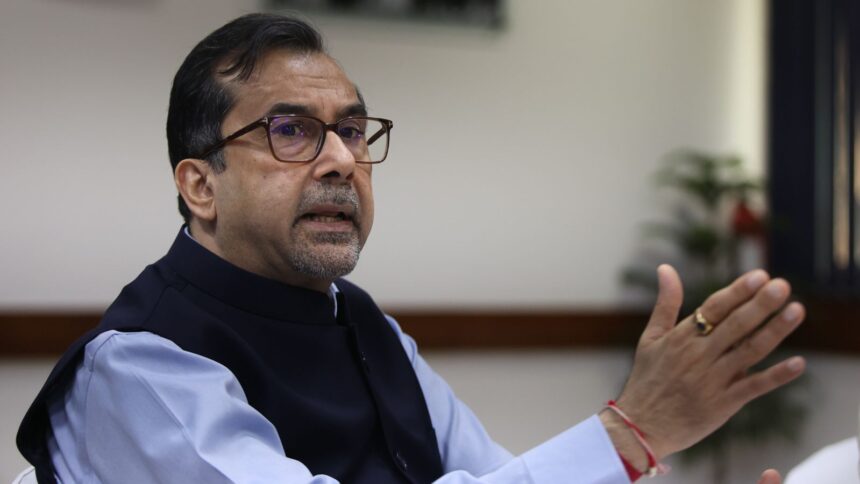India’s free trade agreement (FTA) with the United Kingdom is “historic” and could serve as a “gold standard” for similar discussions with other regions like the United States and Europe, said Sanjiv Puri, President of the Confederation of Indian Industry (CII). In an interview with Aggam Walia and Soumyarendra Barik, Puri also spoke about how the private sector in India needs to substantially increase its R&D spends for national development, why private capex is only a part of the overall economic development agenda, and whether India needs to revisit its trade relationship with China.
Edited excerpts:
The UK FTA came almost as a surprise to many. What is your overall reading of it?
It’s a historic agreement, and real credit to the Commerce Minister and his team, they really put in a lot of hard work. We have been, as part of the delegation, witness to how much hard work was put in for it. This is a historical deal. We have never signed such a comprehensive deal that covers 99 per cent of the tariff lines. It touches manufacturing, services, agriculture. 95 per cent of agriculture tariff lines are getting benefit out of the FTA. It’s a gold standard for all other FTAs. It has also dealt with labour and sustainability issues. We do not know the fine print but it has addressed all of them. It is also a very strong signal to the world that India is serious and ready to take bold steps. And it’s also hopefully setting the tone and pace for two other important FTAs which are in the pipeline which are the EU and the US.
Some sectors like the liquor industry have concerns that the FTA will open it up to a lot of competition. Do you think many of our industries are ready for such competition that will happen due to the FTA?
Let’s look at the benefits of the FTA first. One is that it will open a lot of opportunities for bilateral trade in some very important sectors like labour intensive ones such as textiles. These are sectors that are very important for India because that’s where jobs get created. These sectors may not be material when you count private capex, but on the ground they are more material because the number of jobs, economic multipliers are much much higher. Also, to participate in global value chains, FTAs are very important enablers. It is opening up some part of that. Other FTAs will make it more effective. The world is looking for supply chain resilience, alternatives. This sets the base for alternate new value chains to be developed. On the services side, the Double Contribution Convention makes us competitive, and it covers several sectors, even EPC. It’s a big boost to services.
The Indian liquor industry has its own strengths. There are certain areas that the UK (does better). Both will coexist, thrive, find their own spaces, and play to their strengths.
In the US trade deal, there is expectation that they will push for market access to US farm goods like soybeans. How would that interplay with our own farm policies here?
The sensitive sectors have been kept out of the UK FTA. I expect a similar situation to happen with the US. But negotiations with the UK, and the US might be of a very different nature given the leadership.
I assume so, but I think that sensitivity will still be taken care of from an agriculture perspective. There are some areas to be cognisant of and watchful about. Dairy is one example, soya you mentioned.
I think solutions can be worked out because it does not impact too many lines.
Dumping from China has become a real concern. What do you think the government’s strategy should be in countering that?
The laws for safeguard measures are all there, the government is cognisant of it and is doing its best to bring in the safeguard measures. What the industry will always want is how fast the process can be. But having said that, let me say the government is also very cognisant of it and keen to address it because they have to also take care of certain regulations that have to be followed with the WTO. The only point to see is how we can make it more agile and it will have to be done case by case, not general.
What is important is that the rules of origin, and digital systems for traceability should be very clear. These are important tenets of any effective bilateral trade agreement.
Since 2020, we have adopted a largely protectionist trade stance towards China. Do you think it is time to revisit that relationship?
We have to look at it from the perspective of what is important for national development. We have to deal with it on a case by case basis, and selectively. We have to also be cognisant of national security concerns, and whatever is helpful and works to our advantage, those are the areas we should focus on.
Private capex being sluggish has been a cause of concern for a long time now. When will it pick up?
For India’s growth, we need jobs, including in labour intensive areas. Agriculture is also an important sector which is going to remain a dominant source of growth. Capex is another pillar apart from these two.
Private capex announcements are three times more than what they were pre-Covid. Corporate balance sheets are fine, there is enough liquidity. So the environment is all right for investments.
The only uncertainty is on account of the global environment, which may be creating some hesitation so there could be a shifting of investments. Things are getting better on the consumption front and there is now the benefit of personal income tax as well. There is also going to be the benefit of the cumulative impact of public capex picking up in the second half of last year. Private capex was soft during the election period but has since picked up.
And of course, the more progress is made on the reform agenda, ease of doing business, how fast can you set up manufacturing, buy the land, get all the approvals, all of these make us more competitive.
The Commerce Minister recently urged businesses to focus more on R&D. Most Indian companies spend a small fraction on research work. How can we ever be competitive globally if that remains the case?
I agree that the R&D spend in the economy needs to go up.
The private sector needs to certainly do more and if you want to benefit from all the FTAs and the opportunities, we will have to invest in R&D, there is no doubt about it.
The industry needs to create the culture, create the mindset.








